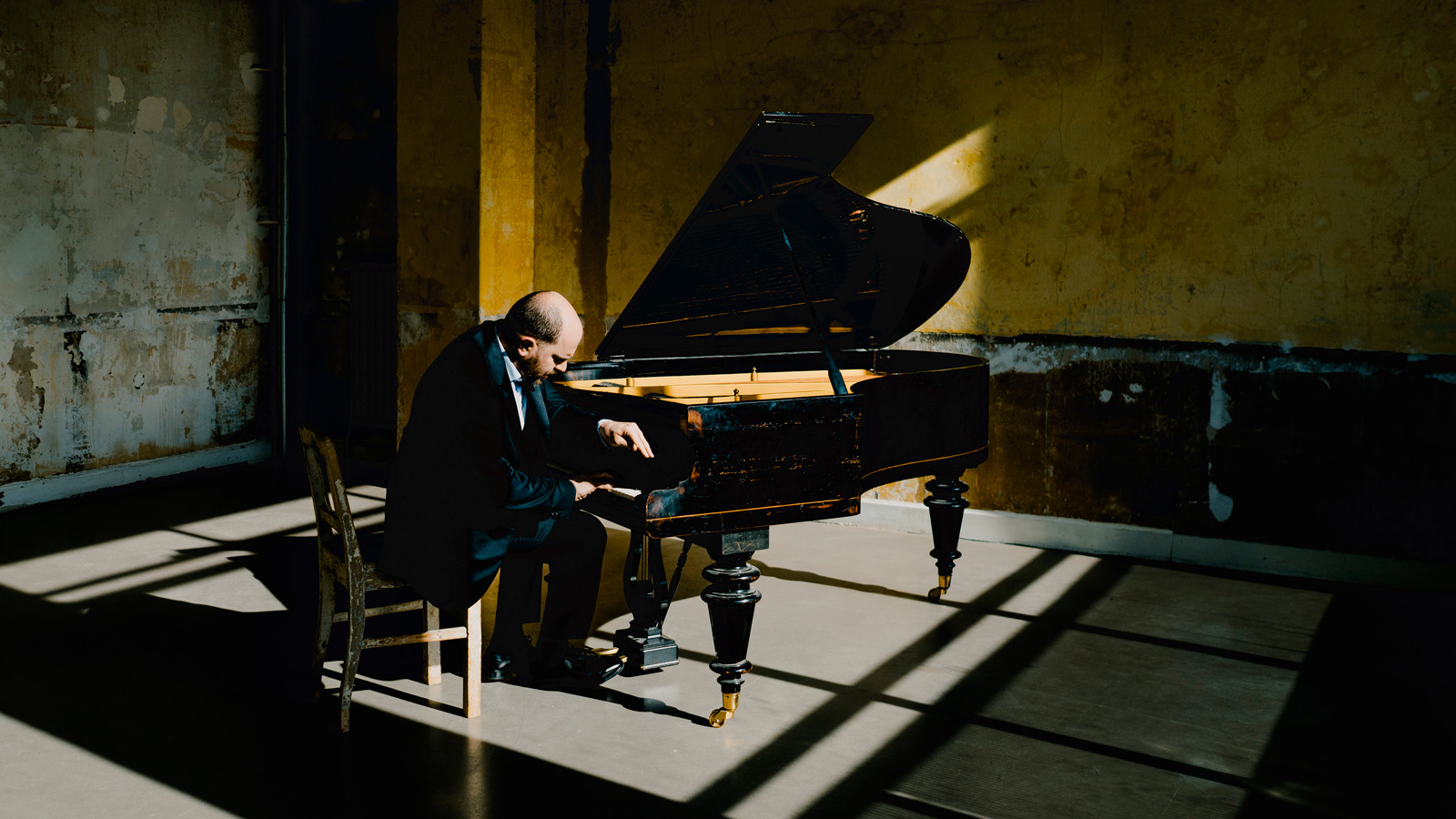Busoni's Piano Concerto
Gulbenkian Orchestra and Choir
Event Slider
Date
- / Cancelled / Sold out
Location
Grand Auditorium Calouste Gulbenkian FoundationThis concert will be broadcast live here on 8 November at 7. pm. (GMT).
Pricing
25% – Under 30
10% – Over 65
Cartão Gulbenkian:
50% – Under 30
15% – Over 65
- Conductor
- Piano
-
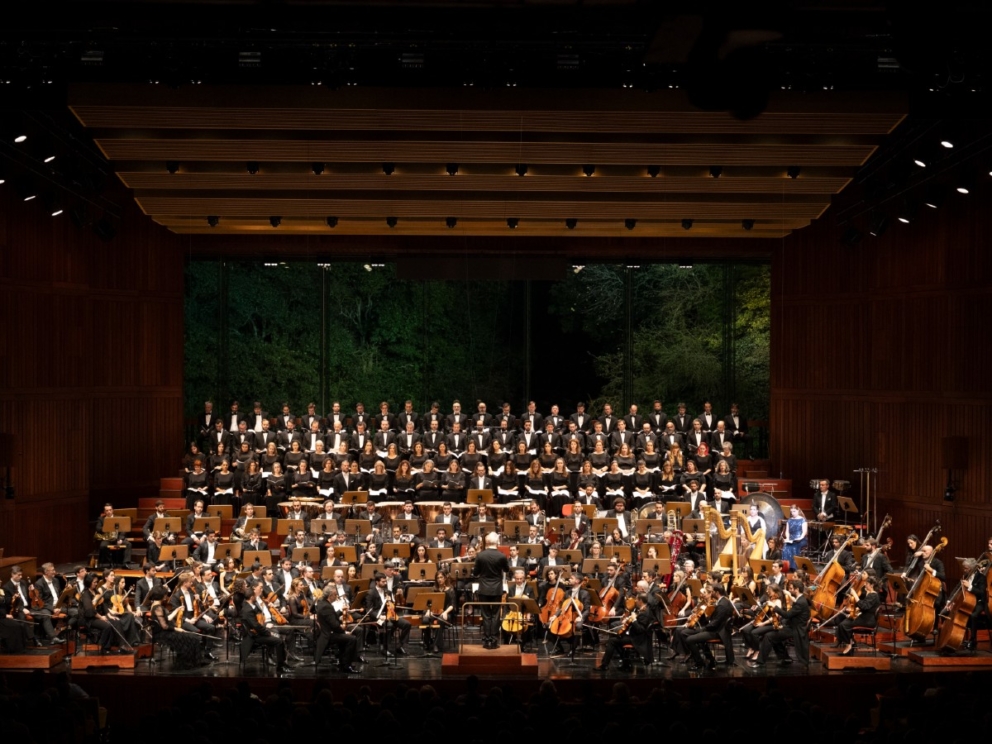
Gulbenkian Choir
Coro Gulbenkian was founded in 1964 by the Calouste Gulbenkian Foundation as a full symphonic body of around 100 singers. The choir joins the Orquestra Gulbenkian and other orchestras to perform Classical, Romantic and Contemporary choral-symphonic repertoire, but can also perform a cappella. It has performed – and often premiered – many 20th century works by Portuguese and international composers.
Coro Gulbenkian has been invited to collaborate with major international orchestras, under the direction of conductors such as Claudio Abbado, Colin Davis, John Nelson, Emmanuel Krivine, Esa-Pekka Salonen, Frans Brüggen, Franz Welser-Möst, Gerd Albrecht, Michael Gielen, Michael Tilson Thomas, Rafael Frübeck de Burgos, René Jacobs and Leonard Slatkin, among others.
Besides its regular season of concerts in Lisbon and frequent national tours, Coro Gulbenkian has repeatedly toured Argentina, Belgium, Brazil, Canada, Denmark, France, Germany, Hungary, India, Iraq, Israel, Italy, Japan, Macao, Malta, Monaco, Netherlands, Spain, the United Kingdom, the United States of America and Uruguay.
Coro Gulbenkian has recorded extensively for Philips, Deutsche Grammophon, Erato, Cascavelle, Musifrance, as well as FNAC-Music, performing a wide range of repertoire, from Early-Renaissance polyphony to Xenakis. Several of these albums received international awards.
Michel Corboz was the Principal Conductor between 1969 and 2019. Jorge Matta and Inês Tavares Lopes are currently the Associate and Assistant conductors, respectively.
-
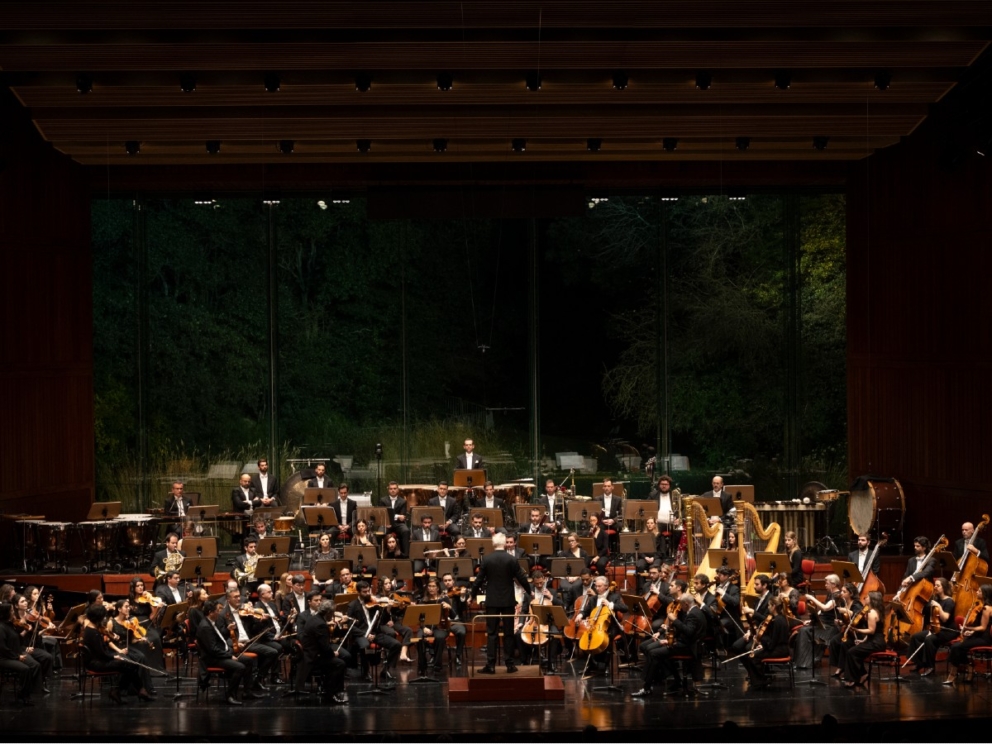
Gulbenkian Orchestra
In 1962, the Calouste Gulbenkian Foundation decided to establish a permanent orchestral ensemble. Originally with only twelve musicians (strings and continuo) it was named “Orquestra de Câmara Gulbenkian”. This collective was successively enlarged and today the “Orquestra Gulbenkian” (the name it has adopted since 1971) has a permanent body of sixty instrumentalists, a number that can be expanded depending on the repertoire.
This structure allows the Gulbenkian Orchestra to interpret works from the Baroque and Classical periods, a significant part of 19th century orchestral literature and much of the music of the 20th century, including works belonging to the current repertoire of the traditional symphonic orchestras. In each season, the orchestra performs on a regular series of concerts at the Gulbenkian Grand Auditorium in Lisbon, where it has had the opportunity of working together with some of leading names of the world of music (conductors and soloists). It has also performed on numerous locations all over Portugal, in an effort to decentralize music and culture.
The orchestra has been constantly expanding its activities in the international level, performing in Europe, Asia Africa, and the Americas. In the recording field, Orquestra Gulbenkian is associated to labels as Philips, Deutsche Grammophon, Hyperion, Teldec, Erato, Adès, Nimbus, Lyrinx, Naïve and Pentatone, among others, and this activity was recognized with several international prizes.
-
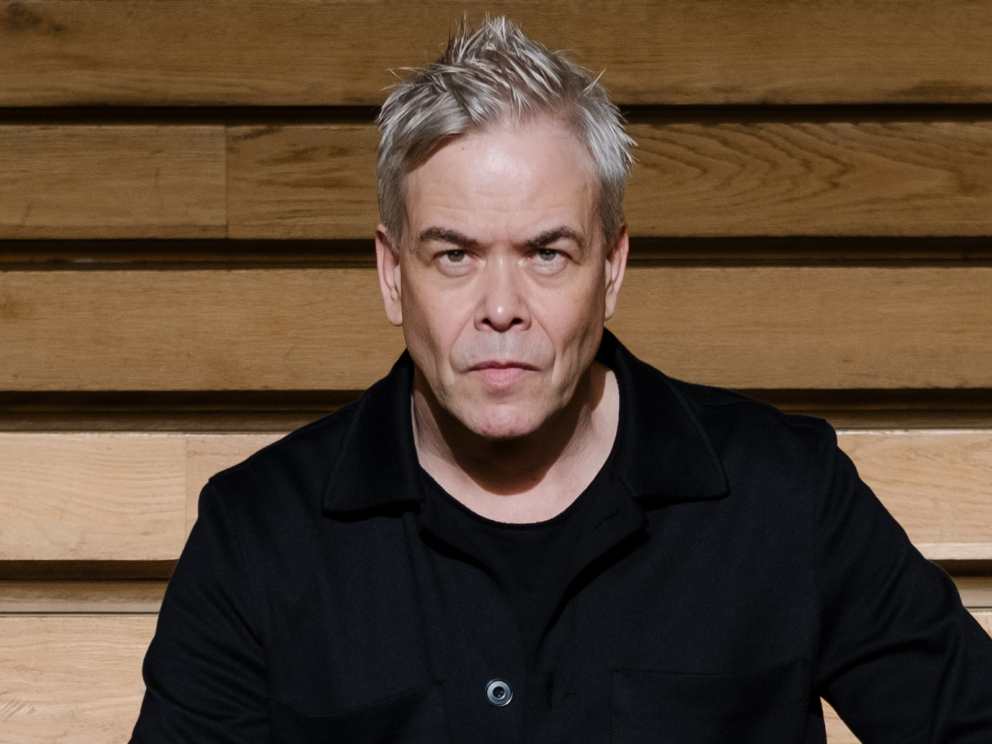
Hannu Lintu
Music Director
“Dynamic and sharp on the podium” (Bachtrack) and with a “scrupulous ear for instrumental color and blend” (Washington Post), Hannu Lintu maintains his reputation as one of the world’s finest conductors. This season, Lintu continues his tenures as Music Director of Orquestra Gulbenkian and Chief Conductor of Finnish National Opera and Ballet, proving himself a master of both symphonic and operatic repertoire. The appointments followed a stream of successful concerts with Orquestra Gulbenkian and breathtaking productions with Finnish National Opera and Ballet. The 2023/24 season also saw his announcement as Artistic Partner of Lahti Symphony Orchestra from Autumn 2025.
Highlights of the 2024/25 season include his debut at Bregenzer Festspiele conducting Oedipe and returns to Chicago Symphony, BBC Symphony, Finnish Radio Symphony, London Philharmonic, St Louis Symphony and Oregon Symphony.
Symphonic highlights of recent years have seen Lintu conduct the New York Philharmonic (including an immediate re-invitation from the orchestra to perform at Bravo! Vail Festival), Berliner Philharmoniker, Cleveland Orchestra, Bavarian Radio Symphony Orchestra, Orchestre National de Radio France, Boston Symphony Orchestra, Swedish Radio Symphony Orchestra, Deutsches Symphonie-Orchester Berlin, Radio Filharmonisch Orkest, Atlanta Symphony Orchestra, Konzerthaus Berlin, Orchestre de Chambre de Lausanne and Orchestre Symphonique de Montréal, alongside the likes of Gil Shaham, Kirill Gerstein, Daniil Trifonov and Sergei Babayan.
As an expert in both operatic as well as symphonic repertoire, Lintu’s recent opera highlights have included Wagner’s Der fliegende Holländer at Opera de Paris and Debussy’s Pelléas et Mélisande at Bayerische Staatsoper as a guest conductor, as well as multiple productions at Finnish National Opera and Ballet, including a recent multi-season Ring Cycle, Poulenc’s Dialogues des Carmélites, Mozart’s Don Giovanni, a choregraphed reimagining of Verdi’s Messa da Requiem, Puccini’s Turandot, Richard Strauss’ Salome, and Britten’s Billy Budd.
Lintu studied cello and piano at the Sibelius Academy, where he also later studied conducting with Jorma Panula. He participated in masterclasses with Myung-Whun Chung at L’Accademia Musicale Chigiana in Siena, Italy, and took first prize at the Nordic Conducting Competition in Bergen in 1994.
-
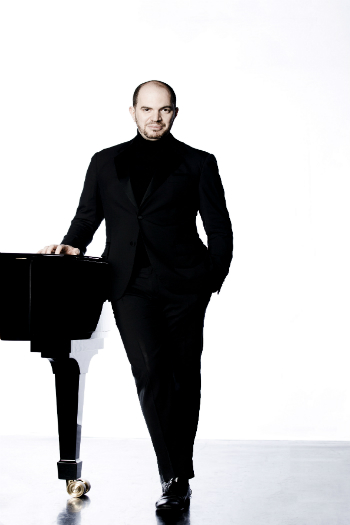
Kirill Gerstein
Piano
Pianist Kirill Gerstein’s heritage combines the traditions of Russian, American and Central European music-making with an insatiable curiosity. These qualities and the relationships that he has developed with orchestras, conductors, instrumentalists, singers and composers, have led him to explore a huge spectrum of repertoire both new and old. From Bach to Adès, Gerstein's playing is distinguished by a ferocious technique and discerning intelligence, matched with an energetic, imaginative musical presence that places him at the top of his profession.
Born in the former Soviet Union, Gerstein is an American citizen based in Berlin. His career is similarly international with world-wide performances ranging from concerts with the Chicago and Boston Orchestras, the Leipzig Gewandhaus, Royal Concertgebouw, Vienna and Berlin Philharmonics, London Symphony Orchestra and the Bavarian Radio Symphony Orchestra (BRSO), to recitals in London, Berlin, Vienna, Paris and New York. In the coming season, Gerstein’s flair for curation will be on display as he becomes Artist-in-Residence with the BRSO and presents a three-part concert series entitled ‘Busoni and His World’ at London’s Wigmore Hall. With the BRSO, Gerstein will perform series of concerts at home and on tour with Alan Gilbert, Daniel Harding, Antonello Manacorda and Erina Yashima.
Gerstein’s forthcoming release on myrios classics will be a double album of music by Debussy and Komitas. He first collaborated with the label in 2010 and, through the partnership has been able to realise many thoughtfully curated projects including Mozart’s Four-Hand Piano Sonatas with his mentor of 17-years, Ferenc Rados; Strauss’s Enoch Arden with the late Bruno Ganz (Wings of Desire; Downfall); Busoni’s monumental Piano Concerto with the Boston Symphony Orchestra and Sakari Oramo; and The Gershwin Moment with the St Louis Symphony, David Robertson, Gerstein’s jazz mentor Gary Burton and Storm Large. Deutsche Grammophon’s 2020 release of the world première performance of Adès’s Concerto for Piano and Orchestra, written especially for Gerstein, with the Boston Symphony Orchestra won a 2020 Gramophone Award and was nominated for three GRAMMY Awards.
A long-time believer in the importance of teaching in the life of a musician, Kirill Gerstein is currently Professor of Piano at Berlin’s Hanns Eisler Hochschule and on the faculty of Kronberg Academy. Under the auspices of Kronberg Academy, his series of free and open online seminars entitled Kirill Gerstein invites is now into its fifth season, featuring conversations with leading musicians, artists, and thinkers which to date have included Ai Weiwei, Iván Fischer, Deborah Borda, Sir Antonio Pappano, Kaija Saariaho and Joshua Redman.
Born in 1979 in Voronezh, Russia, Kirill Gerstein attended one of the country’s special music schools for gifted children and taught himself to play jazz by listening to his parents’ record collection. Following a chance encounter with jazz legend Gary Burton in St. Petersburg when he was 14, he was invited as the youngest student to attend the Berklee College of Music in Boston, where he studied jazz piano in tandem with his classical piano studies. At the age of 16, Gerstein decided to focus on classical music completing his undergraduate and graduate degrees with Solomon Mikowsky at New York’s Manhattan School of Music, followed by further studies with Dmitri Bashkirov in Madrid and Ferenc Rados in Budapest. Gerstein is the sixth recipient of the prestigious Gilmore Artist Award, First Prize winner at the 10th Arthur Rubinstein Competition and an Avery Fisher Career Grant holder. In May 2021, he was awarded an Honorary Doctor of Musical Arts degree from the Manhattan School of Music.
Jean Sibelius
Ferruccio Busoni
In the year that marks 100 years since the death of the Italian composer Ferruccio Busoni, Gulbenkian Music presents the monumental Piano Concerto, op. 39. The Gulbenkian Choir and Orchestra, virtuoso pianist Kirill Gerstein and conductor Hannu Lintu perform a work whose over the top nature and inspiration for romantic music has proved to be an object of great fascination. The first part will feature Symphony No. 3 by Jean Sibelius, a Finnish composer linked to Busoni by a friendship established when the latter was teaching in Helsinki.
Sponsor Piano and Orchestra Concertos
Sponsor Gulbenkian Music
The Calouste Gulbenkian Foundation reserves the right to collect and keep records of images, sounds and voice for the diffusion and preservation of the memory of its cultural and artistic activity. For further information, please contact us through the Information Request form.
